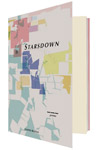If the characters in late-model cyberpunk science fiction (say, in Neal Stephenson’s Snow Crash) wrote good poems, poems that suited their high-speed, high-tech lives, those poems would sound like this busy and brilliant first book. Bernes’s writings take on the what-is-real, what-is-mine questions raised by modern life amid digital media; they depict, too, our need for excitement, for something to do. Los Angeles becomes the capital of Bernes’s twenty-second century, a post-hyper-afterlife whose parking lots show “A few // Cars left over from the petroleum era but / mostly just slots in the form of our evacuated // Categories.” His high-velocity sentences invoke changeable exteriors, video highways to nowhere, and “mismanaged generations run aground” on a “permanent pink” beach, caught up in hall-of-mirrors epistemes: “Them filming them filming them… It breaks the plane.”
Though he begins and ends with short poems driven by images and ideas, Bernes devotes the middle of his volume to a sequence that tells a story. “Promissory Notes” follows the beveled and sad career arc of Henry Halflife (a.k.a. Henry Hendecasyllable), an outsider artist of the near future (modeled, as Bernes says, on the real painter Ralph Blakelock) who writes his poems on checks. Prose blocks describing the arc of Henry’s career alternate with reproductions of Henry’s poems: one has, for date, “Camera: demiseminever”; for pay to the order of, “Agent Orange Groves et al”; and, in place of a dollar amount, “Virgin Birth Studios, all my fallen Hollywoods.” Henry incarnates past and present L.A.—“The phone book was his concordance, The freeways his veins”—and his work highlights the paradoxes in trying to make an art that defies exchange value. For Bernes, that’s a task very much like not thinking of elephants, and Henry’s poems, like Bernes’s, flaunt the pachyderms that were never there.
Bernes can slip into a theory-soaked postmodern lingo, with nods to the thinkers Guy Debord and Georges Bataille and to the California poet and blogger Joshua Clover (who may run the very mysterious press). Clover might almost have written Bernes’s “Nine Pools,” a poem that includes the halftime score “Depth (0) <> Surface (1).” Yet compared with Clover—and with other with-it contemporaries—Bernes sounds far more earnest and attentive to things seen, heard, and felt firsthand. If the sometime predictability of borrowed ideas is the worst thing about his jumpy, almost ADHD poems, his faith in his own inventive verve is the best. We hear that...
You have reached your article limit
Sign up for a digital subscription and continue reading all new issues, plus our entire archives, for just $1.50/month.
Already a subscriber? Sign in





